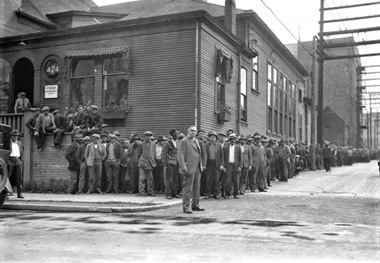
Rev. Andrew Roddan is photographed circa 1932, after having created the soup kitchen during the great depression, which still operates today. (image from First United Facebook)
Andrew Roddan is not a name most Vancouverites could immediately identify. But it should be – and a new book allows us to see how he and other United Church preachers contributed so much to the fabric of Canadian society.
Moments in Time: Sermons from the United Church of Canada, 1910 – 2010 gathers together two or three sermons from each decade in the first century of the United Church’s life.
The editors, HyeRan Kim-Cragg and Don Schweitzer give voice (again) to speakers with a range of perspectives.
Each sermon “is accompanied by historical context, an analysis of homiletical techniques and the influence of each sermon and preacher.” Several preachers with strong roots in British Columbia are included.
Roddan may not be a household name, but those who chronicle Vancouver’s history have not forgotten him. For example, Todd McCallum wrote about ‘The Reverend and the Tramp, Vancouver, 1931: Andrew Roddan’s God in the Jungles‘ in BC Studies, Autumn 2005.
And ABC Bookworld, which provides “extensive reference information for books and authors pertaining to British Columbia,’ began its entry:
Homelessness has been an issue in British Columbia since the Depression. As much as anyone, Andrew Roddan began the ongoing struggle against homelessness in Vancouver’s Downtown Eastside during his 19 years at the First United Church, from 1929 until 1948.
The Scottish-born clergyman became known as the Apostle to the Poor, locking horns with Mayor Gerry McGeer, lobbying for improved social welfare programs and providing an estimated 50,000 meals to the unemployed during the winter of 1930 – 1931.
Like J.S. Woodsworth and Tommy Douglas, Andrew Roddan was a Bible thumper from the prairies who preached the Social Gospel. He felt morally obliged to translate his Christian sympathies into practical acts to improve the well-being of others.
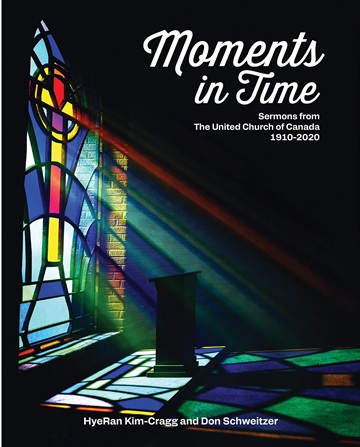 The selection chose for Moments in Time is ‘The Cost of a New World,’ broadcast by radio and published by Roddan in The Christ of the Wireless Way (1929 – 1932).
The selection chose for Moments in Time is ‘The Cost of a New World,’ broadcast by radio and published by Roddan in The Christ of the Wireless Way (1929 – 1932).
The editors echoed, in part, the ABC Bookworld comment, recognizing a unique balance then found in the United Church, one which arguably has not fully persisted:
Roddan expounded and practiced a version of the Social Gospel that was typically Canadian in its evangelical inspiration and its call for the conversion of individuals and society as a whole. He believed that answers to the needs of both were to be found in the gospel.
The editors introduced the piece by quoting some of Roddan’s commentary – specific to the time, but also uncomfortably current – in God in the Jungles (one of several books he wrote):
First United is wedged in between some of the most densely populated and cosmopolitan groups in any Canadian city. Off our front steps, to the north, 8,000 Japanese live in a very confined area, and to the south at our back door 8,000 Chinese are packed in and around Pender Street. . . .
. . . the jungle is composed of old shelters made out of old tins, boards, boxes, disused motorcars, anything and everything, gathered from the dump heap nearby and formed into a rough shelter into which crawl, not animals, but homeless men, without saying their prayers, feeling as the Psalmist felt when he said, “No man careth for my soul.”
Roddan, say the editors . . .
. . . named the sins of Canadian society and the international community that had caused the crisis of homelessness in Vancouver. He challenged the moral complacency of Canadians fortunate enough to have incomes. He denounced the sinful nature of an acquisitive culture oblivious to the suffering of others. He laid out a social program for social transformation on the basis of love for others demanded by the gospel.
Here is a short portion of Roddan’s sermon. After discussing “the evils of nationalism and individualism . . . a greedy and cruel system of capitalism . . . some of the low, base, pork barrel type of politicians . . . we have refused to pay the cost of a new world order,” he said (in words very appropriate to this Easter season):
Nearly 2,000 years ago there came One into this world to show men the way to a new life and experience. He came from a poor home, born of a despised and conquered race. He lived in an obscure town and province.
He had no university degrees, and He lived under the cold shadow of a dead religion. He had never travelled more than a hundred miles from home. He had no money, few friends, no politics and no ready cut theories or platform. He had no class consciousness. He never led an army or wrote a book.
But he lived and served so intensely for three years that the world has never been the same since he left it.
He poured out his life in courageous living and He challenged your life and mine. He said, “I am the Way.” The way to peace, to happiness, to prosperity, to brotherhood. “Follow Me,” but remember you must be prepared for the cross. There’s the rub. We all want the day of peace and plenty, but we cannot have it until we are prepared to pay the cost.
The editors follow up with two types of commentary, each a couple of pages, and not without some elements of critique:
- Homiletical Excellence: “While Roddan’s sermon is identified as a prophetic and deductive sermon, his way of talking about Jesus is quite captivating.”
- Historical and Theological Significance: “Roddan castigation of racial oppression is significant. However, looking back with the hindsight of over 90 years, it must be noted that his prophetic critique makes no mention of injustices suffered by Indigenous Peoples.”
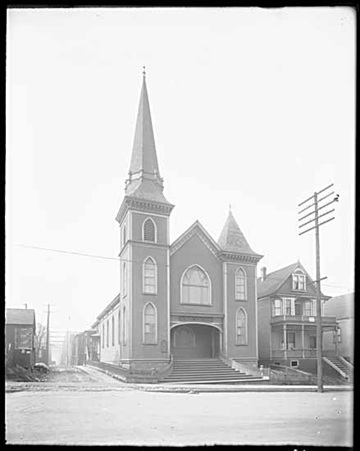
First Presbyterian Church built a church at 152 Cordova Street in 1886. Pictured is the rebuilt church after the original was destroyed in the Great Vancouver Fire. The congregation would later become First United Church. VPL Photo #7986 by Philip Timms in 1907.
Roddan’s heirs retain many elements of his message and work. Amanda Burrows, Executive Director of First United wrote a timely comment May 4, “celebrating 140 years of dignity, belonging and justice.”
She said:
On a Sunday in May 1885, a small congregation met together for its first church service at the Hastings Mill schoolhouse.
That congregation evolved into what First United is today. 140 years later, we’re known as one of the oldest service providers in the community, bringing dignity, belonging and justice to people experiencing extreme poverty and homelessness.
The legacy continues:
As much as we’re reflecting, we’re also looking at the bright future ahead. I’m holding close those two constants: our responsiveness, and you, our community.
The City of Vancouver is currently trying to change the Downtown Eastside Local Area Plan which will allow more market-rate housing in the neighbourhood.
This is a grave mistake that will further displace and marginalize the DTES. If rent and land values go up here – where will our neighbours go? So, we are mobilizing in response.
Go here for the full comment.
Carmen Lansdowne, who was Executive Director of First United before Burrows and is now the first female Indigenous Moderator of the United Church of Canada, wrote the Foreword for Moments in Time.
Roddan is just one of many preachers covered by Moments in Time. All are interesting and all receive good introductions and analysis. The other BC notables are:
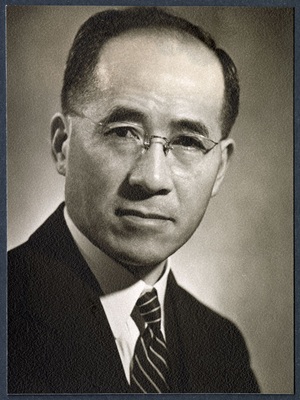
Kosaburo Shimizu
- Norah Hughes: Born in England, she was raised in a nondenominational church which became part of a United Church. She graduated from Union College (the precursor, along with Anglican Theological College, to Vancouver School of Theology) and in 1939 “became the first woman to be ordained in what was the BC Conference.” After completing a PhD in history she served in several pastoral charges. Her untitled sermon, delivered in Hazelton September 29, 1940, considers Galatians 5:1 (“be not entangled again with the yoke of bondage”), including the role of women.
- Kosaburo Shimizu: He was born in Japan, and moved to BC as a teen in 1907. He ran a night school for Japanese immigrants at the Powell Street Japanese mission and then studied at Union College before serving again at the mission. He and his family were forced to leave the coast, along with all others of Japanese ancestry, in 1942. His ‘Legacy for Posterity’ sermon was delivered at Kaslo Church November 28, 1943. He later served in Toronto and Winnipeg.
- Sang Chul Lee: Born in a farmhouse near Vladivostok, Russia, he and his family went to China in 1931, where he encountered Christianity at a mission school. He fled China to Korea in 1945, never to see his parents and siblings again. He attended Union College from 1961, returning to his wife and children after completing his degree. The family moved here when he became minister of Steveston United Church in 1965, before being called to a Korean church in Toronto. He became Moderator of the United Church in 1988. He delivered ‘Looking Only to What is Before’ (“a window on the world of Korean and other racialized immigrants in the late 1960s”) as his inaugural sermon at Toronto Korean United Church.
-
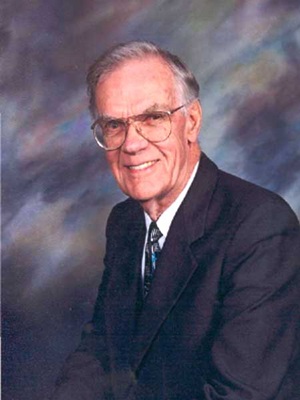
Jack Shaver
Jack Shaver: He imbibed the ethos of All People’s Mission in Winnipeg, where his father had taken over from the renowned Methodist minister / social activist / politician J.S. Woodsworth. Born in 1918, he did not arrive in BC until 1959, when he became the first United Church chaplain at UBC. He spent 1973 to 1982 at First United Church. (He and is family lived on our block in West Point Grey, but through a combination of immaturity and religious ignorance I failed to learn anything from him. His kids were nice.) Grace was a key theme for him, and the editors note that he “engage[d] the liberal ethos that he shared with the congregation” in his ‘The Gospel is Light’ sermon, delivered in Ontario in September 1961.
Shaughnessy Heights United Church hosted the editors of Moments in Time and a panel on the evening of May 4.
Don Schweitzer and HyeRan Kim-Cragg were joined by Nam Ok Yoo, Coordinating Minister of West Point Grey United Church, Clif Prowse, a long-time member of Shaughnessy Heights, and Ray Aldred, Director of the Indigenous Studies Program at VST and ordained with the Anglican Church of Canada.
The evening was introduced by the church’s Coordinating Minister David Moors and hosted by CBC radio host Dan Burritt.
Kim-Cragg said it had been “a daunting task, to choose only two or three from each decade. There was lots of searching for sermons. Must was left out, much is left to be discovered.” The editors made a point of thanking Blair Galston, Regional Archivist of the Pacific Mountain Council. (I wrote about him and his work with the Chinese and Japanese communities here.)
Nam Ok Yoo described Nora Hughes’ sermon as “a profound reflection on human liberty.”
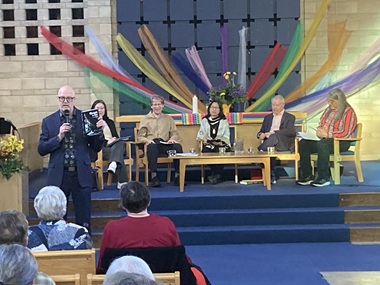
Shaughnessy Heights minister David Moors holding a copy of Moments in Time, with panelists (from left) Nam Ok Yoo, Don Schweitzer, HyeRan Kim-Cragg, Clif Prowse and Ray Alfdred.
Ray Aldred said he enjoyed the presentation for three main reasons:
- he is always interested in the historical development of theology in a church, in this case better understanding what underlying theology is driving the United Church;
- it helped him to think through when the United Church became aware of the implications of Indigenous issues and residential schools;
- he wondered, where did the evangelistic fervour of the early Methodists go?
Clif Prowse focused on Jack Shaver, saying there were some who thought of him as a prophet.
Moments in Time will be valuable for members of the United Church to read, to get a better sense of where they came from. But it should also be in libraries across the nation, both public and religious.
As the editors point out, roughly 20 percent of the Canadian population belonged to the United Church during the 1950s. United Church preachers have had a a very significant influence on Canadian culture.

Andrew Roddan is someone known to me through his son, Sam Roddan, who was my high school English teacher and who inspired me to become an English teacher. Sam would often regale us with tales of his childhood and himself became a well known author.